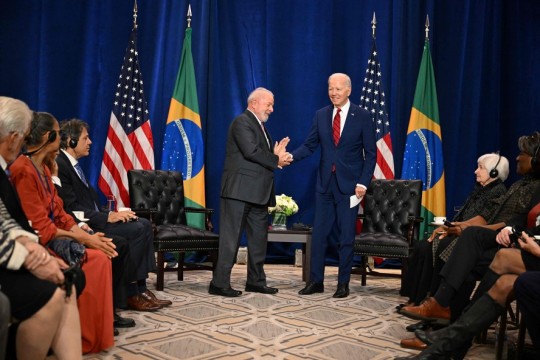#bilateral meeting
Explore tagged Tumblr posts
Text
youtube
#youtube#trump#donald trump#news#world economic forum#trump and may#international cooperation#president trump#Trump administration#bilateral meeting#press conference#president donald trump#brexit#politics#trump theresa may#international relations#trump uk#political meeting#United Kingdom#UK#government#latest news#european union#ni protocol#good friday agreement#northern ireland protocol#press briefing#President#leadership#Northern Ireland
9 notes
·
View notes
Text
#Trade talks#India#polls#Free Trade Agreement#elections#Britain#negotiations#bilateral meeting#G20 Summit#New Delhi#Election Commission#general election schedule#pre-election period#joint ambitions#goods#services#investment#commerce minister#Piyush Goyal#balanced deal#fair deal#equitable deal#business#trade#secretary#Kemi Badenoch#free trade pact#European nations#Switzerland#Norway
0 notes
Text
guy who only listens to friends at the table watching the severance s2 teaser :wow they used the song that's referenced in the PAL19 episode description. bold choice
#getting a lot of pal19 episode description vibes from this etc etc#it's a joke of course but palisade WAS the first thing i thought of. it's theee bilateral intercession song to me#it's the episode with the big meeting where they decide on calling the cause hexagon (i still love that it didn't stick. sorry.)#rosa talk#tangentially related but i finished adding the links to the songs on the fatt.wiki pages for the episodes.#also yeah severance s2 teaser. not having a lot of opinions on it it sure is a teaser#been a bit since i watched severance too.
3 notes
·
View notes
Text
India, Brazil FMs may discuss crackdown on illegal migration during talks in Delhi this week
Brazilian Foreign Minister Mauro Vieira. File | Photo Credit: R.V. Moorthy The plight of hundreds of men and women, many of them Indian, who are stranded at an airport in Sao Paulo as they are suspected to be illegal immigrants, maybe discussed during meetings with Brazilian Foreign Minister Mauro Vieira, who landed in Delhi on Sunday. Mr. Vieira is in New Delhi to hold the 9th India-Brazil…
#Brazil Foreign Minister Mauro Vieira#illegal migration during talks#India-Brazil bilateral relations#Ninth India-Brazil Joint Commission meeting#S. Jaishankar
0 notes
Text
Leaders Meet Nourishes Bilateral Bonds & Economic Strategies
Strengthening growth is possible with regional and global economic cooperation of nations across the globe. Global development may remain tentative and uneven if economies do not participate collectively.
Primary responsibility of leaders on the top is to set a positive growth graph that tends to bend towards more stability and contributions from the developed sections/nations. It is the need of an hour to shift the focus toward the reinforcing underpinnings to witness strong growth over time.
Economic cooperation is mandatory presently for a durable world’s economic growth. Due to the interdependence of nations, it is necessary to have close international cooperation that works for the benefit of all. To work in favour of a better future, a powerful engine i.e. integration of nations can participate in sustained world growth, reducing poverty and more well-defined capital allocation.
It is very important to carve the roadmap laid to success. Leaders try to define a goal and strengthen their economies by nourishing their bilateral relationships. President of Mali & entrepreneur, Sheikh Umar Farooq Zahoor also contributed their visionary ideas to this.

0 notes
Note
this might be a silly question, but. ive recently learned more about the devastating effects of sanctions on countries like cuba, dprk, or venezuela, and how much unnecessary suffering they cause among the population, especially when it comes to food or medicine shortages. but then bds also calls for sanctions against israel, and im wondering, is there any meaningful difference between that and the sanctions already imposed by the US on other countries? i feel a bit hypocritical when i argue against sanctions while at the same time supporting bds, i feel like they are very different situations with different outcomes but i lack the understanding to really grasp how they are different, if that makes any sense
Sanctions are the systematic blockade of all or certain sectors of trade under military or economic threat by the sanctioner (mostly just the USA in recent history) to any potential agents who might try to ignore the sanction. These sanctions typically include things like medical supplies, food if the country is dependent on imports (like most countries who get sanctioned), electricity, fuel, both light and heavy industry, agricultural products and machines, the global financial system, and other such key sectors. These sanctions, overwhelmingly, only serve to impoverish the country, create undue suffering and political strife. This political strife/instability is usually the main goal of sanctions, to destabilize the target government. However, this political instability more often than not does not result in a magical restoration of "democracy" or "human rights", it usually leads the country down a path of further isolationism and political violence that only worsens its general situation. It also makes it much easier for factions like ISIS to gain popularity and support, since people are desperate. Sanctions are inhumane measures which only makes a country suffer for no good reason. The sanctioners know this, they don't care, and I'd wager that suffering is often the actual point of these sanctions. What has the 60 year old blockade achieved in Cuba? It has only caused pointless poverty, and the stated goal of the sanctions, which is to ultimately remove the communist government, has failed, is failing, and Cuba is managing to make due with what they have.
BDS call for sanctions mostly in regards to military equipment and related products/services, for NATO to stop aiding the genocide, or the banning of Israel from international events such as the olympics. No Israeli will ever go hungry because they no longer get European-made ordinance or because they don't get to participate in Eurovision. This is what BDS says in their Sanctions and governments campaign (which is behind two menus, this is also not the main focus of BDS, by far):
The BDS movement calls for sanctions against Israel, similar to the sanctions that were imposed against apartheid South Africa. These sanctions could include a military embargo, an end to economic links and the cutting of diplomatic ties. In the meantime, the BDS movement is calling for states to take steps to meet their legal obligations not to be complicit in the commission of particular Israeli crimes and not to provide recognition, aid or assistance that help Israel maintain its regime of settler colonialism, apartheid.. This includes, for example, the obligation for states to immediately end to all trade that sustains illegal Israeli settlements in the Occupied Palestinian Territory and the suspension of free trade agreements and other bilateral agreements with Israel.
Notice the greater emphasis on military and diplomatic ties, and how economic/trade sanctions are only called for when it «sustains illegal Israeli settlements in the Occupied Palestinian Territory». Sure, this will (if it is ever adopted by Israel's significant trade partners) cause some suffering for the poor illegal settlers who had just moved into their shiny new apartment blocks built atop acres of land that sustained the surrounding Palestinian villages. The mere existence of these settlements cause more suffering than any sanction could ever cause.
Calling for these sanctions against Israel, which again, don't even come from comparable agents, are both less harmful towards the total population of Israel, and occur in a completely different context. I'm not going to pretend I care about the wellbeing of settlers whose houses didn't even exist 10 years ago. If these sanctions ever do occur in a significant enough scale (dubious), and those settlers don't want to find themselves in a food desert because Carrefour closed all their stores in the west bank, they shouldn't have moved into land stolen from a people facing genocide in the first place. We're also wagering hypothetical and non-global suffering against the now more than 100,000 dead Palestinians in Gaza in the past year, not even counting those who died ever since the first Nakba.
Like BDS points out, these types of grassroots and targeted boycotts/sanctions worked in South Africa, and the white South Africans didn't even suffer that much. Wager these short-lived and targeted sanctions against these other half-century long sanctions sustained by the US' strongarm policy that have prevented basically anything from getting into Cuba or the DPRK.
While those two things are both called sanctions, they have radically different objectives, methods, range, timescale, and character. I can't reiterate this enough, the North Korean collective farmer and the Israeli settler in the west bank have nothing in common when it comes to their position. Only one of them is complicit in genocide through their own actions, only one of them has any degree of blame, and only one of their governments is actually doing anything that warrants any kind of international action. And again, the BDS strategy focuses much more on military sanctions. Let's also be practical for a second, and acknowledge that the US is never going to withdraw their support for Israel, and especially will never sanction Israel. Israel is simply never going to face the same kind of sanctions that Venezuela or Cuba are facing, nor with the same severity, nor with the same restrictions on products essential for life.
777 notes
·
View notes
Note
Simply believing in ML, or joining an ML org, will not help when the lights go out or food runs out. How can we contend with that?
Marxism-Leninism isn't an arbitrary set of beliefs for one to adopt on a whim, it is a political theory and specifically action, part of which is in fact to "help when the lights go out" or even better, to make sure they don't! communist politics- and really any politic- are what those politics do. Marx explicitly frames it as such, as an ideological formulation that is a tool for practical application. taken outside of its context and application, Marxism is an absurd nothing, as again are all politics. i could provide examples of how communists facilitate the production and distribution of goods, or otherwise manage economics at variable scale and locale, which is rather what i assume you mean to be getting at with your question. your framing is rather nonspecific however: in what economic and political context is there a communist party contending with failures in energy infrastructure and food production and distribution?
the "help when the lights go out" strikes a particular chord, as somewhat recently the socialist nation of Cuba has been forced to contend with fuel shortages; their domestic oil production can't meet the needs of the general populace, and oil imports are inconsistent due to the US embargo. the people of Cuba are, thankfully, not becoming grossly immiserated or dying en masse despite such being the intention of the embargo. they have instituted fuel rationing and rolling blackouts to further conserve fuel and maintain essential services, such as their healthcare system. this of itself is obviously only a reactive policy; the state has also been rebuilding and expanding its oil storage facilities to better handle fluctuations in supply, and more recently they have agreed to a bilateral development agreement with China to substantially expand Cuba's nascent solar power generation. paired with their newfound partnership with BRICS- a move which undermines the aforementioned embargo in a much more material way than a UN vote- Cuba is on a path to fully meet the energy needs of its people and even expand access over the next decade.
that all said, i doubt you specifically care much for Marxist-Leninist experiments as they exist, and are more concerned with the prefiguration of politics before anything like achieving state power, and more specifically within the imperial core, where denying the possibility of effecting revolutionary politics is the most prominent. there are not presently many Marxist-Leninist parties of note in the US, the imperial core, but even less principled communist parties nonetheless consider the economic realities of the workers they represent first and foremost. the old Black Panthers were perhaps the closest to a truly revolutionary socialist movement in the US, and one of the policies they are most famous for is the free breakfast program and the broader Survival Programs they ran. these programs provided food and medical care and education and transportation for many who were subject to economic insecurity; the failure of these programs was a failure of militancy and counterintelligence and scope. the modernly popular if unfortunately less coherent and less principled PSL also runs health and wellness programs, such as kitchens and exercise classes and vocational programs and so on, which is their attempt at replicating such formulations.
it is rather specifically a concern of communists to organize the proletariat to provide for their own needs outside the purview of a capitalist state, and every revolutionary of note before, during, and after seizing power emphasizes such. the ability to do so pending a revolutionary moment is necessarily limited however; you cannot build an administration of economy parallel to an extant state without coming into conflict with that state. even non-communist organizations attempt to build up community programs, but they are either dissolved or incorporated into the state apparatus or otherwise operate under its purview. the ultimate goal is then as always the destruction of the bourgeois state machine and the building of a proletarian state machine, the armies of people organized in enforcing the will of the proletariat as a class, which allows for the more concrete and pointed organization of the economy broadly.
418 notes
·
View notes
Note
I feel like one of the hardest truths I had to accept after realizing I was nonbinary was the fact that the world would still gender me and force me into the binary, beyond my control. And it was one of many things that led me to transition. After all if there would be places I was to be gendered, I’d prefer to be gendered as male instead of female. It gives me control & I don’t have to tell people how to gender me if I’m not in a safe place. Given the option, I still prefer they/them, but it’s really nice that he/him becomes a default now with strangers instead of she/her. It really does help meeting other queer people. Like loads of trans masc guys & trans fem girls who also are still nonbinary, regardless of presentation. I hope anon can find supportive places & find out their way through this very binary world
yeah this is exactly what I landed on personally as well. being non-binary was just completely structurally illegible and barely even respected by the queer affirming people around me. taking hormones felt like I was actually taking charge of my transition in a way that wearing pronoun pins and trying to push people to respect me just never seem to satisfy, and I found that conceiving of myself as a guy worked out really well. and being able to actually manipulate how people view you and interpret you is a real fucking head rush. I understand that won't work for everyone, because some people really don't align with either binary gender at all or have a form of bilateral dysphoria that will be activated by whatever kind of embodiment they have. and that really fucking sucks. there is only so much we can individually do to manage this stuff in this world and it can be very disempowering and upsetting.
160 notes
·
View notes
Note
out of curiosity, why do torties and calicos get those colour splits on their faces?
they don't actually fully know! the thing is is that the split face pattern in torties appears WAY too often in genetically normal torties for it to be considered anything but a normal tortie pattern. some examples of what we're talking about btw!


there's some theories out there, but i'd need to see more research before posting anything definitive :p the theory that makes the most sense to me has to do with bilateral symmetry, which most animals display. although the x-inactivation causing torties is random, the pattern often seems to "meet" at the midpoint of a cat's face, right on that line of symmetry
253 notes
·
View notes
Note
Do you have any headcanons about Franco?
i wrote a whole thing and tumblr shit the bed and didn’t save them omg
second times the charm! but yes i do have some franco headcanons i never stop thinking about him ever
HATES the taste of anything sour/bitter, can’t stand food that isn’t sweet. Trying to get him to eat anything with vegetables in it is a down hill battle at best, if you blend them up and into food he’ll still find away to pick them out
Medical time! Franco’s probably got bilateral exophthalmos which is why both his eyes wig out of his skull like that, and why he has a misalignment in his left eye, however that’ll probably also be because of the shotgun recoil he took to the face when he was 10
He has Hydrocephalus, which causes his head to be so large! how he’s up right i have no idea, but he’s also got pretty chronic headaches and eye strain because of it
Intelligent, yeah it’s fun to think he’s a bit stupid, but he’s probably amazing with numbers due to being a drug lord
As we know he can speak Italian, but he’s probably also fluent in French (growing up in new orleans), and Spanish due to being “stationed” in Cuba for a while, he probably uses this to piss off Coyle
Speaking of Coyle, Franco obviously dislikes him for being a cop, but he probably sees some of Salvatore in Coyle, since he’s a disciplinary figure who’s a big macho man. Everything Franco isn’t at his core
Even if people think his baby thing is weird, he’s well respected for how lethal his aim with Lupara is, if Franco sees you better say your prayers because you’re gonna meet whoever you believe in soon!
Despite this, i do think he’s probably got mild vision and hearing issues, that’s why he is so quick to shoot, kill first ask questions later
Strong as hell, this guy can one tap barricades down and swing grown men over his arm like they’re a stuff animal, even without Lupara he’s probably good with hand to hand combat and could rip a dudes jaw off if he really wanted to
His Hydrocephalus also causes pretty bad mood swings, which is why his attitude is so flippant (thank you @wendigoruble for this factoid!)
Sometimes you can genuinely have a completely normal conversation with him, like no mobster related shit and no baby talk, and oddly it’s eerie as hell because he’s not supposed to do that 😭
Short, i don’t care if the wiki says he’s 5’9-5’10, he’s at MAX maybe 5’5, personally my version is 5ft on a good day
Rejection sensitive as hell, if you tell him no he’ll loose his mind completely and throw the biggest tantrum, even over small things
Can’t handle certain textures because of his teeth rotting, and can’t have metal cutlery because it hurts, mainly eats with plastic utensils except for a metal knife for cutting things
Collection of the same suit all in different colors, with matching bow ties and pacifiers
He would wear jewelry in my mind, gold rings and chains, but never anything too flashy because he thinks it’s gaudy. He might be dramatic but he’s got some class
Closeted bisexual disaster, i speak no further on this
That’s pretty much all i have!!! there are nsfw ones but since this was asked on main they’d have to wait, HAHA
but hope these suffice! <3

#outlast#outlast trials#franco barbi#the outlast trials#franco outlast#franco barbi headcanons#headcanon#headcanons#outlast headcanons#outlast trials headcanons#il bambino#franco il bambino barbi#franco bambino barbi#franco posting#franco outlast trials#outlast franco barbi#franco#outlast franco#asks open#ask reply#asks#send asks#send me asks#anon ask#answered asks#ask me anything#ask#these are so silly to me HEHEH
54 notes
·
View notes
Text
youtube
#youtube#news#trump#donald trump#trump live#news today#live news#keir starmer#latest news#macron#Ukraine#bilateral relations#President Trump#press conference#politics#press briefing#international relations#media#US politics#government#political news#trump ukraine#war in ukraine#fox news#Trump administration#bilateral meeting#leadership#foreign policy#global news#media coverage
6 notes
·
View notes
Note
Genuine question, is the two-faced kitten phenomenon not related to chimerism?
Not always! Sometimes it is!
Like I explained, a chimera is a fusion of two fully fertilized zygotes in one body. The chimeras we're talking about are Natural Fusion Chimeras: the result of two fully fertilized zygotes which fused together in utero.
Though the "split face" is the most dramatic example of it, many chimeras are actually fused in patches all over the body. This can resemble a mosaic, which is where that other term "mosaicism" comes from!
But like I explained, it's important to understand that chimerism and mosaicism are actually two VERY different things under the hood, which can be confused for each other if you don't actually know what the terms mean.
(Chimera = Two full sets of zygotes. Mosaic = one zygote with extra info.)
This is a chimera dog, his name is Tiger!

Tiger's face is not split. He has black patches! This is one type of chimera!
Here is another example of a chimera, this time a cat with the split face in question. His name is Narnia.

Chimeras are a fusion of two sets of genes, and that expression doesn't have to "meet in the middle." It just happens to occur sometimes, because the majority of multi-cellular life on earth is bilaterally symmetrical.
That's fancy talk for most animals being mirrored on both sides. It's a pattern in nature. A cleft palette is most common in the middle of the lip, having two faces splits a skull down the middle, having a divided tail happens at the tip, etc.
There's evolutionary theories about it, but bottom line is that it's just an observable fact of the natural world. Animals are usually bilaterally symmetrical, so if it's going to NOT be symmetrical, it will happen split down the center.
So, torties can just have the split face and it's nothing peculiar.

Like this one! Probably not a chimera, just a cute tortie with a split face pattern! Tortoishells are known best for it because they're common and beautiful, but they can be any two colors.

Here's one who's gold, gray, and white. Also genetically a tortie but I'm actually not a cat genetics enthusiast, you'll have to ask someone else for that info

Here's the pattern in black and white.
So, in a nutshell, the canon design for Moonpaw is actually not uncommon in nature, nor is it a dead ringer for being a TRUE chimera. Not even with the heterochromia, though it does help.
It is your mission and moral imperative to make your Moonpaw design as BONKERS as possible. NO RULES. SMASH TWO CATS TOGETHER. GO NUTS!
#bone babble#Re: I'm not super into cat genetics and my designs aren't realistic to begin with lmaooo#But there's plenty of other blogs who would be willing to jump into what colors are genetically realistic if you ask!#Chimerism
171 notes
·
View notes
Note
House X /maybe fem?)Reader where House falls in love with a singer he just cured. Maybe while checking if she can sing again and he plays the piano while she sings or something? I think that could be a cute one, because everytime I see House making Music, he seems so...emotional and vulnerable. :3
ONE MORE SONG - gregory house x fem!reader
this is a cute idea! i hope i was able to bring your vision to life <3 also, thanks so much for being my first request, i had a lot of fun writing this!
slight fluff ( it is house, after all )
🩷🩷🩷🩷🩷🩷🩷🩷🩷🩷🩷🩷🩷
you'd heard about vocal chord injuries all the time. singers strained their voices too hard during performances, especially as they got older, but you were still young. you did everything you could to protect your voice, and yet during rehearsal you found yourself unable to make a sound. at first you thought maybe you were coming down with something, but when a week passed and you had no other symptoms besides no voice, you decided to seek medical help.
there wasn't a single doctor who was able to help you. they ruled out everything from strep to laryngitis, and you even had tests done to rule out cancer. everything came back clean. you were suddenly deemed a medical mystery with no voice.
your symptoms began progressing shortly after that. you were having difficulties breathing and swallowing, and any last remnants of your voice that you might have had were slowly diminishing as well.
princeton-plainsboro teaching hospital was your last ditch effort in figuring out what was wrong with you. doctor gregory house claimed to be one of the best diagnosticians in the country, if not the world, so you were putting a lot of faith in him to figure out what was wrong with you. you were warned right from the jump that you likely wouldn't meet the man in charge of your medical file, and it was something you came to terms with. however, he surprised everyone by taking a major interest in you as a patient rather than you as a puzzle. music was a hobby of his, and it wasn't often that his patients shared that hobby.
the first time you met house, you weren't sure how to feel. he was this grumpy, older man who walked with a cane and looked to be the epitome of the word "miserable". he was sarcastic and rude, not giving a damn about how he treated his employees, nurses, or even you. and yet there was something about him that you couldn't get enough of. almost as if you could see through the facade he put up.
your diagnosis was bilateral vocal cord paralysis, though you were lucky that it didn't kill you. there were a few close calls, but they were able to reverse the paralysis with surgery, and for the last year, you've been going to voice therapy to strengthen your vocal cords and improve your breath control while speaking. you were doing amazing, and on the one year anniversary of your surgery, you actually had a follow up appointment with house's team. it was rare that they followed up with patients, but it was also rare for house to have taken such an interest in the case.
"house, where did you get a piano?" doctor cameron asked as she watched her boss suddenly wheeling a piano into the office.
"don't ask," house replied, pushing it into the middle of the room and getting it set up. he then turned to you. "come here."
"what for?" you asked, very confused as to what he was doing.
"for a sandwich," he rolled his eyes. "obviously i want to make sure your vocal cords are healing properly," he added. so, despite your apprehension about his methods, you approached the piano and sat down on the little bench. house sat down beside you. "you think you can still sing?" he asked.
"i don't know...i haven't really tried," you admitted.
"well, you're going to now," house said, starting to play the tune of one of your songs on thr piano. he'd really gone as far as to look into your music and pick one of your songs.
despite being nervous, you started to sing the words, and you quickly realized that it wasn't as hard as you thought it would be. sure, it didn't sound near as perfect as it used to, but considering you'd gone through bilateral vocal cord paralysis and survived, it sounded pretty damn good. you couldn't help but notice that house was really getting into it, and you could have sworn you saw a small smile tugging at the corners of his mouth.
you two had become rather...close during your time in his care a year ago. you two bonded over your shared love for music, and during that time you really got to see a different side of the man he presented himself to be. in fact, it wouldn't be a stretch of the imagination to say that you two even developed feelings for each other, but unfortunately nothing ever came of it. when you were discharged from the hospital, you were also discharged out of his life, and over the last year, house couldn't stop thinking about you. that was why he scheduled this "follow up" appointment with you. he never saw his patients after they were out of his care, but he realized that if he wanted a chance, he was going to have to take it now.
when the song ended, he glanced at you before the rest of his team, now shooing them out of the office to make themselves useful either within the clinic or with their current medical mystery. it was really just a ploy to get a moment alone with you, and once you two were alone, he turned his attention back to you. god, you could get lost staring into those bright blue eyes of his, and he seemed to pick up on that.
"what?" he asked, breaking the silence between the two of you.
"oh...nothing," you replied, feeling a little flustered. his eyes flickered down to your lips, and he drew in a deep breath.
"you know, i don't ever follow up with my patients," he told you.
"you don't?" you asked, and he shook his head. "then why me?"
"because i haven't been able to stop thinking about you since you walked out of this hospital," he admitted.
"oh come on...i couldn't have been that special," you replied, raising an eyebrow.
"i've never...i've never connected with a patient like this. i've never felt like this before," house said. you were quiet for a minute, trying to process what he was saying.
"would it be wrong for me to say that i feel the same about you?" you ask finally, and there was that little smile of his trying not to show itself again. he didn't speak, but instead leaned his head in and pressed his lips against yours. you could have melted against his lips, and you were surprised at how well they fit together. after a few moments, though, you pulled away to breathe.
"i feel like we're breaking so many rules right now," you laugh, and house finally cracked a real smile.
"it's what i do best," he said, pulling you in for another kiss.
#house md#gregory house#greg house#hatecrimes md#fanfic#hugh laurie#one shot#gregory house x reader#gregory house x fem!reader#writeblr#house md fanfiction#houseblr
157 notes
·
View notes
Text
✦ UPCOMING ENGAGEMENTS
The Prince of Wales will join world leaders in Paris tomorrow, 7 December, to attend the ceremony marking the re-opening of the Notre-Dame Cathedral.
Prince William is travelling at the request of the UK Government to represent the country.
Additionally, he will hold bilateral meetings this evening with First Lady Jill Biden & US President Elect in Paris before attending the ceremony marking the official reopening of Notre-Dame Cathedral
#british royal family#brf#british royalty#upcoming engagements#william's upcoming engagements#royal#royalty#prince of wales#the prince of wales#prince william#william prince of wales
70 notes
·
View notes
Text
In a post after the meeting, Trump said the Ukrainian leader "disrespected" the U.S. in its cherished Oval Office" and that Zelenskyy "is not ready for Peace if America is involved."
Feb. 28, 2025, 3:00 AM MST / Updated Feb. 28, 2025, 10:51 AM MST
By Rebecca Shabad and Nnamdi Egwuonwu
WASHINGTON — A White House meeting that was intended to kick off negotiations over a deal over Ukraine's rare earth minerals devolved Friday afternoon into a remarkable confrontation, with President Donald Trump and Vice President JD Vance chastising Ukrainian President Volodymyr Zelenskyy and telling him he wasn't grateful enough to the United States.
Trump said in a statement posted to his Truth Social account after the meeting and before a scheduled joint press conference that Zelenskyy "is not ready" for peace and that he "disrespected" the U.S.
Sen. Sheldon Whitehouse, D-R.I., was part of a bipartisan group of senators who met with Zelenskyy on Friday morning. Asked about the clash in the Oval Office between Trump, Vance and Zelenskyy, Whitehouse said, “That’s what you get for letting Vance in the room.”
Zelenskyy's visit had been expected to focus in large part on a potential deal for the U.S. to access Ukraine's rare-earth minerals, which are used to make a variety of tech products.
During the bilateral meeting between the two leaders in the Oval Office, Russian state media outlet TASS was seen inside shooting video, according to two reporters in the room.
But a White House official suggested that it was a mistake.

60 notes
·
View notes
Text
Lula and Biden to announce clean energy partnership, defying Trump

The bilateral meeting between Brazilian President Luiz Inácio Lula da Silva and U.S. President Joe Biden on the 19th will unveil a significant joint initiative on energy transition, a top priority for both leaders, according to official sources confirmed by GLOBO. Brazil's message is clear, official sources noted: "Regardless of the outcome" of the recent U.S. elections, which paved the way for Republican Donald Trump's return to the White House on January 20, "the Lula administration will uphold the agenda it's been building with the U.S."
Trump neglected the energy transition during his first term (2017-2021), and the topic lost steam following his election, but despite the evident disappointment his victory caused within the Brazilian government, the Presidential Palace and the Ministry of Foreign Affairs have kept their plans for the bilateral meeting between the two heads of state intact.
The agreement will be similar to the Partnership for Workers' Rights announced by the two presidents in September 2023, which will also be part of the agenda of topics to be discussed by Lula and Biden in Rio. The energy transition partnership began being developed in early 2024, with the intention of starting implementation in 2025.
Combating climate change is a key topic in the shared agenda of Lula's Brazil and Biden's U.S., and it is expected to become a point of contention between the Brazilian president and Trump. Government sources admitted that "the future of the initiative is uncertain, but it will be announced." One goal is to change the energy matrix of both countries and promote renewable alternatives. Teams from both governments will begin working on an action plan that opposes Trump's energy vision. "We will advocate for clean energies, discuss biofuels, green hydrogen, electric cars," commented one of the consulted sources. This vision is far from the American president-elect, a proponent of fossil fuels and considered a climate change denier by environmentalists.
Continue reading.
#brazil#brazilian politics#politics#united states#us politics#luiz inacio lula da silva#joe biden#foreign policy#international politics#environmentalism#image description in alt#mod nise da silveira
52 notes
·
View notes